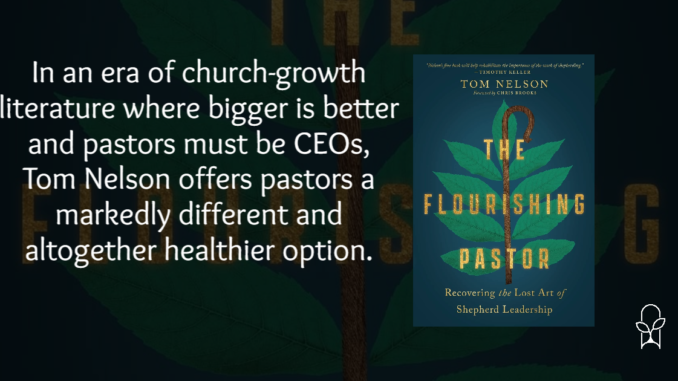
Published by IVP on December 14, 2021
Genres: Non-Fiction
Buy on Amazon
Goodreads

Pastoral leadership is in crisis. It's not just that many pastors feel overwhelmed and stressed out; many have lost their way. With the risk of burnout at an all-time high, what pastors need is not just a new leadership strategy, but a new framework for ministry--one that will help them move from survival to flourishing. In these pages, Tom Nelson looks to the biblical image of the shepherd leader in response to the contemporary context. If pastors are to lead congregations, then they must first learn what it means to be led by the Good Shepherd. Pulling from his years of experience as a lead pastor and president of a nonprofit, Nelson offers pastors and ministry leaders a timely vision for leadership that incorporates in-depth biblical teaching and whole-life discipleship. His wisdom and insight provide a roadmap for ministry resilience and longevity.
We are in the middle of a clergy crisis. I knew that before beginning my doctoral studies on clergy loneliness, mental health, and burnout, but having inundated myself in the literature I’ve become even more convinced of it. A fair amount of clergy are not doing well and many of them would step away from being pastors if it wasn’t out of financial necessity. Speaking into that situation is Tom Nelson, president of Made to Flourish, a network that seeks to empower clergy and congregation in flourishing. His new book, The Flourishing Pastor, not only identifies some of the reasons behind the clergy crisis, but offers clear, biblical, and time-tested ways of creating healthy, long-term ministry and healthy, flourishing pastors.
Nelson divides The Flourishing Pastor into three parts: (1) emphasizing the metaphor of shepherd, (2) emphasizing integrity, and (3) emphasizing the power of presence. Overall, Nelson’s thesis is simple, but revolutionary: pastors must be shepherd-leaders who live lives of integrity and who live and work among the people they serve.
In part one, The Flourishing Pastor presents three paths that Nelson writes are particularly common and perilous. First, the celebrity pastor. While this is most common in megachurches, Nelson is also clear that mega-egos reside in churches of all sizes. Churches are more than platforms or brands, and a single charismatic leader holding all the power will eventually lead to destruction. The second is the visionary leader. Vison, Nelson writes, with or without “God told me” authority, can be deceptive, especially as leaders look forward to an unrealized ideal instead of working within the context they have. Third is the lone ranger pastor, those pastors who lead alone and have no community. Leaders divorced from their community will suffer from loneliness and isolation and their ministries and personal lives will suffer as a result. So how do we find our way back?
Part two offers a better analogy for leadership, one found throughout Scripture—the shepherd-leader. Nelson offers the following guideposts toward flourishing: trusting in God, heeding the shepherd’s call, embracing obscurity, pursuing integrity, and cultivating leadership competency. Using Psalm 78 as a guide, The Flourishing Pastor works through each of these sections. Notice how unlike most leadership literature this is. It’s not focused on the followers or focused on results, but on the internal, spiritual life and posture of the leader.
The final part of the book talks about some of the practicalities of ministry. The first one that Nelson writes about is the pastor as a faithful presence within the community. My experience in church leadership and academia is that pastors are not often seen as integrated within the communities they serve. The Flourishing Pastor notes that effective leadership is going to mean understanding and living within the situations of those you have been called to serve.
My only criticism of the book is that each chapter really needed to be its own book. Because of the scope of Nelson’s work, many of the specifics he covers are written about in just a few paragraphs or pages. Nelson is able to give readers a firm foundation, but space does not allow for a deeper dive into the issue or more specific direction. It’s a criticism of praise, I suppose. The Flourishing Pastor is the beginning of the conversation, not the end. It’s broad enough that you’ll find yourself in it, yet specific enough to point you in the right direction toward wholeness and healing.
I’m imagining many pastors picking this book up based on the title, because they don’t feel that way. The Flourishing Pastor offers hope to burnt-out pastors that leadership doesn’t have to be like this. It offers gentle criticism and redirection from pastors who have been trying to do it all by themselves. It guides clergy back into their communities, asks that they think smaller, and focus on the simple task of shepherding those God has given to them. In an era of church-growth literature where bigger is better and pastors must be CEOs, Tom Nelson offers pastors a markedly different and altogether healthier option.
